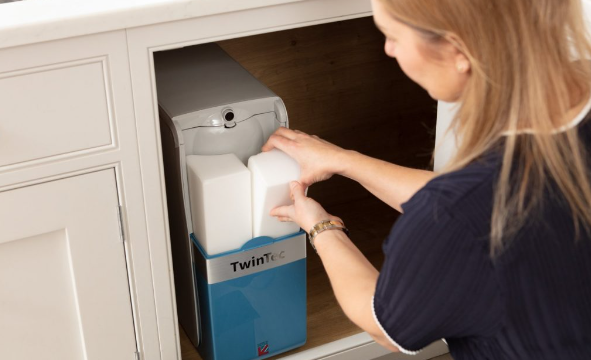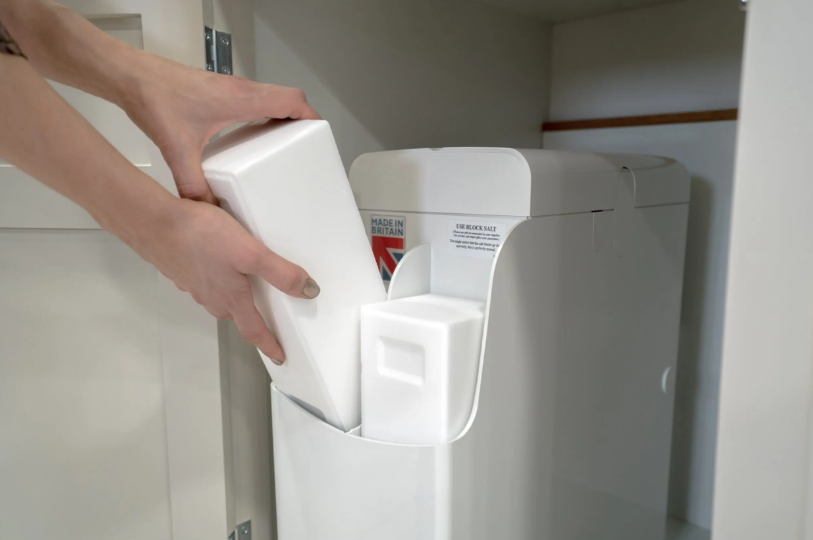Block Salt for Water Softener [A Detailed Info]
The world of water softening can be a tad overwhelming. With myriad options available, one might wonder, “Which is the most efficient choice for my water softener?” Enter block salt: a champion in water softening, backed by science, and preferred by households and experts alike. For more information on various applications and to explore different services, you can visit ehallpass login. So, let’s dive deep into understanding why block salt has become the go-to choice for many and how you can best utilize it.
How Does Block Salt Work in a Water Softener?

Block salt is composed mainly of sodium chloride. When added to a water softener, it helps in the ion-exchange process. As hard water passes through the softener, calcium and magnesium ions are exchanged for sodium ions, resulting in softer water. Simple, yet highly effective!
Where Can I Buy Block Salt for My Water Softener?
You can purchase block salt from local home improvement stores, specialty water treatment shops, or online marketplaces. Some brands even offer water softener salt delivery options, making the process seamless.
Advantages of Using Block Salt in a Water Softener

- Block Salt vs. Granular Salt: Block salt is compact, leading to less bridging in the brine tank compared to granular salts. This means fewer blockages and smoother operation.
- Efficiency: Block salt offers a consistent dissolution rate, ensuring optimal softening over time.
- Environmentally-Friendly: Some block salt brands emphasize eco-friendliness, minimizing environmental impact.
Choosing the Right Salt for Your Water Softener
While block salt is a popular choice, ensure your softener model supports it. Reading the manufacturer’s instructions or consulting with a water treatment professional is always recommended.
How Often Should I Add Block Salt to My Water Softener?
The frequency depends on water hardness and usage. Regularly check the salt level in your brine tank. If it’s below one-third full, it’s time to add more.
Are There Any Alternatives to Block Salt for Water Softening?
Yes, options include salt pellets and granular salt. However, many find block salt to be the most efficient due to its compact nature.
Block Salt vs. Table Salt for Water Softening
While both are primarily sodium chloride, table salt may contain additives unsuitable for softening purposes. Stick to salts designed for water softeners.
Do Block Salt Water Softeners Require Less Maintenance?
Block salt tends to reduce bridging, leading to fewer blockages. However, regular checks and occasional maintenance are still necessary.
Determining the Right Amount of Block Salt for My Water Softener
Typically, a household of four in a hard water area might use two blocks of salt monthly. Yet, always monitor your usage and adjust accordingly.
Environmental Concerns with Block Salt
Modern block salts are crafted keeping the environment in mind. Always opt for brands emphasizing sustainability and reduced environmental footprint.
Can I Switch from Granular Salt to Block Salt in My Water Softener?
It’s possible, but consult your manufacturer’s guidelines or seek advice from a water treatment expert.
Diving Deeper into Block Salt: Insights and Innovations
The increasing demand for block salt in water softeners is no accident. As more homeowners recognize the importance of soft water for both appliance longevity and personal well-being, the search for efficient, user-friendly solutions intensifies. And right in the midst of this quest, block salt continues to shine.
Block Salt Benefits for Water Softening
- Uniform Dissolution: Block salt’s consistent shape means it dissolves at a predictable rate, making it easier to gauge when you’ll need a refill.
- Minimal Residue: With fewer impurities than other forms of salt, block salt reduces the chance of residue build-up in your softener, meaning less frequent cleaning.
- Compact Storage: Due to its shape and size, storing block salt is more straightforward than dealing with bags of granular salt or pellets.
Environmentally-Friendly Water Softener Salt
As environmental concerns come to the forefront, the water softening industry isn’t left behind. Block salt producers are continuously innovating to reduce waste and ensure sustainable sourcing. Many are moving towards recyclable packaging and processes that consume less energy.
Tips for Storing Block Salt
- Keep Dry: Always store block salt in a dry place, away from moisture. Exposure to humidity can cause it to degrade faster.
- Elevate: If possible, place the salt blocks on wooden pallets or shelves. This ensures they remain dry even if the floor gets wet.
- Seal Tightly: If your block salt comes in a resealable package, always seal it tightly after use to prevent contaminants.
Block Salt for Hard Water Treatment
Areas with hard water contain elevated levels of calcium and magnesium. Block salt’s efficient ion-exchange process ensures that even in regions with the hardest water, residents can enjoy the benefits of soft water.
Water Softener Salt Pellets vs. Block Salt
While pellets are another popular choice, they can sometimes create bridges or mush in the brine tank. These issues can interrupt the ion-exchange process. Block salt, due to its compact nature, offers a solution to these challenges.
Salt Block Dissolution Rate
Different brands may offer slightly different dissolution rates, but generally, a block salt will last for about 4-6 weeks in an average household. It’s vital to ensure the blocks remain submerged in water for the best results.
Block Salt for Residential Water Softeners
While block salt is versatile enough for commercial settings, its real charm shines in residential systems. Its user-friendliness, combined with efficient performance, makes it a top choice for homeowners.
Exploring Block Salt Brands for Water Softeners
The market is rife with various brands, each promising the best results. Look for brands with a proven track record, positive user reviews, and a commitment to sustainability.
Water Softener Salt Delivery Options
Many suppliers recognize the need for convenience and offer delivery services. Regular schedules or on-demand options ensure you never run out of essential block salt.
FAQs on Block Salt for Water Softeners
Is block salt better than salt pellets?
While both are effective, block salt is preferred by many due to its compact nature and reduced chances of bridging.
Can block salt be used in commercial systems?
Absolutely, provided the system supports it.
Any health considerations with block salt?
Block salt only adds minimal sodium to water, posing no significant health concerns.
Signs my softener needs more block salt?
If water feels harder or soap doesn’t lather as easily, check your salt level.
Tips for extending block salt life?
Regularly clean the brine tank and ensure it’s free from any debris or insoluble matter.
Also Read: Why are Electric Cars Better than Petrol and How do they Work?
In Conclusion: The Undeniable Efficiency of Block Salt
Water softening is not just a luxury but an essential aspect of modern living, especially in areas with hard water. Block salt emerges as an unparalleled hero in this narrative, offering efficiency, convenience, and sustainability. As more research and innovation enter the scene, block salt’s prominence in water softening will only solidify further.



